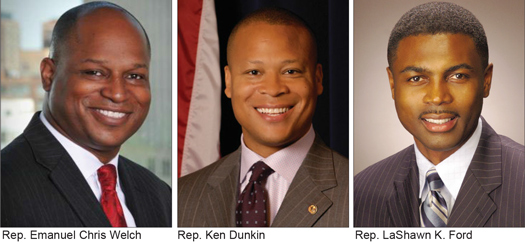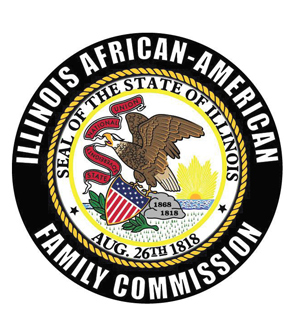A looming budget battle in Illinois?
By Ashahed M. Muhammad -Assistant Editor- | Last updated: Mar 20, 2015 - 12:30:05 PMWhat's your opinion on this article?
Republican governor’s proposed budgetary cuts concern community, sharply criticized by policy makers

|
The Illinois African American Family Commission held a Town Hall Meeting March 11 to address serious concerns regarding the human services impact proposed budgetary cuts by Illinois Republican Governor Bruce Rauner could have.
“Our response was to have a community meeting to discuss those cuts and the impact of those cuts on our communities,” said IAAFC executive director Michael Holmes. “We know and recognize that people are listening to the media, people are getting information from other sources, and we want you all to know what the situation is with this budget,” he added.
Gov. Rauner still has obstacles to hurdle before his proposed fiscal year 2016 budget is passed. Democrats control the General Assembly, and the powerful Speaker of the House Michael J. Madigan has clearly stated that he disagrees with Rauner’s fiscal approach.

|
The IAAFC has taken the point position hosting weekly meetings for the past five months with constituents to address issues that continue to plague Black communities statewide such as inadequate education, lack of jobs, low levels of business investment, poor services and the criminal justice system. It is vital for Black people to understand how policy and legislation affects Black communities and if any decisions are made regarding Blacks, Blacks must be consulted, and organizations should resist attempts by others to pit groups against each other, Holmes noted.
Robert Otter, budget director for the Center for Tax and Budget Accountability discussed Gov. Rauner’s $6.3 billion dollars in proposed cuts and shared detailed information regarding the state budget. Questions related to local budgets and tax policies, which have contributed to the structural deficits faced by the state, were addressed as well. Gov. Rauner has two choices, raise revenue or cut services, and clearly, he has chosen the latter, said Mr. Otter.
“The governor’s proposal is a ton of cuts,” said Mr. Otter. “He has yet to present as governor any sort of revenue enhancement or revenue increases,” he said.
David Whitaker of the Chicago Area Project said there is the danger of political brinksmanship taking place with deals and decisions being made by those who have no knowledge of conditions existing in Black communities. They are the ones determining what are considered “essential and non-essential” services to be funded or cut.
“We have to make sure these people are culturally competent. That is absolutely essential,” said Mr. Whitaker. “Who knows more about what are essential services to our community than the folks right here in this room today?” he added.
Those who make the decisions are hoping that there will be no outcry, Mr. Whitaker noted, however, there are many groups, coalitions and organizations demonstrating against these cuts, and more are planned.
“All of that is great and all of that has to continue,” said Mr. Whitaker. “The more you demonstrate, the more you get their attention,” he added.
On Feb. 18, the IAAFC met in Springfield to discuss carving out a Black Agenda for the state, how to obtain additional monies for Black residents and communities, and to provide public policy expertise to the Illinois legislative Black Caucus. If the coalition is successful in their attempts at holding Gov. Rauner and the state’s legislators accountable for budgetary decisions, it could have national implications if similar agendas can be approved state-by-state going into the 2016 presidential election.
“Black people have been left out so long, even Blacks think it is all right,” said Mr. Holmes. “Today is the day we are going to start something different in the State of Illinois,” he added.
Despite the fact that there are more Black elected and appointed political officials than at any time in history, Black communities still lack a strategic alignment of resources with community stakeholders, Mr. Holmes noted. Familiar with the constant refrain that the state is in dire straits financially, Mr. Holmes was unapologetic.
“There’s always money,” said Mr. Holmes. “What we are saying is—we want our money! We don’t have to talk about the same things over and over again if we can get these funds into our communities,” he added.
According to statistics provided by the IAAFC:
- Blacks make up 32 percent of those unemployed in Illinois.
- The Black median household income was nearly $20,000 below the state average of the median household income made by Whites.
- Black children are 56 percent of those in foster care.
- Blacks make up 58 percent of the adult prison population and 60 percent of the juvenile prison population.
Following Gov. Rauner’s February 18 speech from the capitol, the IAAFC heard no new solutions to the problems plaguing Black communities, and the members of the Illinois Legislative Black Caucus were underwhelmed and highly critical of his approach.
“It’s pretty much what we had anticipated and expected given that he talked about it throughout his year campaign. We are really looking at giving him an education on how this thing works. You can’t squeeze blood out of a turnip and you also have to take into consideration that some of us are experts and we want to help,” said Illinois State Representative Ken Dunkin. “It’s going to be an education and clarification session because he doesn’t know, and some of the people around him don’t know. He also probably has some people around him who are vengeful, and they are going to get an education as well,” Rep. Dunkin added.
As chair of the Higher Education Appropriations Committee, Rep. Dunkin is especially concerned about Gov. Rauner’s proposed 31.5 percent across the board cut in funding for higher education and reducing alternative school program funding by 60 percent. “You can’t invest in early childhood education at the beginning then severely cut and reduce the higher education component,” said Rep. Dunkin.
Rep. LaShawn K. Ford, urged against a “penny-wise but pound-foolish approach” as the budget for the state of Illinois is crafted.
“Gov. Rauner has a tough mission to accomplish, given the fact that our state has a $300 million short fall in child care funding for low-earning families and a potential budget shortfall of approximately $5 billion in the spending year that begins on July 1,” said Rep. Ford. “This financial crisis is one that has occurred over time, and we should not expect the problem to go away by cutting support services to the most vulnerable families across the state. The state must find ways to eliminate waste and not eliminate services and programs that support Illinois’ families. We must have a budget that is not penny-wise and pound-foolish, costing the state more in the long run from cuts to programs that could leave families hopeless,” Rep. Ford added.
Emanuel Chris Welch described Gov. Rauner’s proposed cuts as “draconian” and said his decisions would hurt working class families across the state.
“It stands to hurt communities all across the state but particularly urban districts,” said Rep. Welch. “Those are things that really concern me, concerns the caucus and we are going to all have to work together to make sure the governor does not follow through on all those cuts,” said Rep. Welch. “We cannot cut our way to a balanced budget.”
INSIDE STORIES AND REVIEWS
-
-
About Harriett ... and the Negro Hollywood Road Show
By Rabiah Muhammad, Guest Columnist » Full Story -
Skepticism greets Jay-Z, NFL talk of inspiring change
By Bryan 18X Crawford and Richard B. Muhammad The Final Call Newspaper @TheFinalCall » Full Story -
The painful problem of Black girls and suicide
By Charlene Muhammad -National Correspondent- » Full Story -
Exploitation of Innocence - Report: Perceptions, policies hurting Black girls
By Charlene Muhammad -National Correspondent- » Full Story -
Big Ballin: Big ideas fuel a father’s Big Baller Brand and brash business sense
By Bryan Crawford -Contributing Writer- » Full Story






 Click Here Stay Connected!
Click Here Stay Connected!








